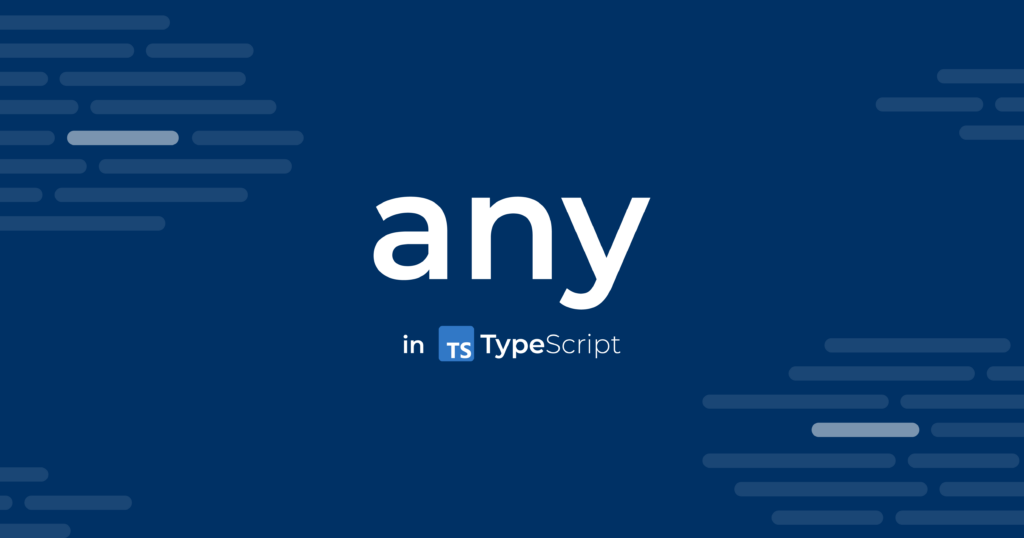Demystifying the Usage of "any" in TypeScript: Examples and Best Practices

Introduction
TypeScript has revolutionized the realm of JavaScript development by introducing a robust type system that enhances code reliability and prevents runtime errors. A central feature of TypeScript is the "any" type, which can be both a powerful ally and a potential pitfall. In this article, we'll delve into real-world examples to illustrate when it's appropriate to use "any" and when it's better to avoid it in TypeScript.
Understanding "any"
In TypeScript, the "any" type serves as a wildcard that suspends static type checking for a particular variable or value. It effectively tells the TypeScript compiler to relinquish its grasp over type enforcement for that specific entity, allowing it to be assigned and manipulated without type-related constraints.
When to Use "any"
Legacy Codebase Migration: Consider a scenario where you're transitioning a legacy JavaScript codebase to TypeScript. Some parts of the code might lack explicit type annotations. The "any" type can be your ally during this transition phase, allowing you to integrate existing code seamlessly while gradually adding type annotations where necessary.
Example:
// JavaScript code
function legacyFunction(value) {
return value + 10;
}
// TypeScript migration
function enhancedFunction(value: any): number {
return value + 10;
}
Interacting with External Libraries: Many times, you'll encounter third-party JavaScript libraries that lack TypeScript type definitions or have incomplete typings. Using "any" can provide a temporary workaround until you have proper typings available or create your own.
Example:
// Using an external library without type definitions
import ThirdPartyLibrary from 'third-party-library';
const result: any = ThirdPartyLibrary.someFunction();
Dynamic Data Handling:
When dealing with dynamically structured data like JSON responses from APIs, "any" can offer flexibility. This is valuable when you're working with data structures whose shapes might change at runtime.
Example:
const apiResponse: any = await fetch('https://api.example.com/data');
const parsedData: any = await apiResponse.json();
// Accessing dynamic properties
const value: any = parsedData.dynamicProperty;
Prototyping and Experimentation:
During the prototyping phase or when exploring new ideas, focusing on functionality often takes precedence over type accuracy. "any" can provide the breathing space you need to iterate quickly.
Example:
// Prototyping a new feature
function prototypeFunction(input: any): any {
// ...code for experimentation
}
When to Avoid "any"
Type Safety and Predictability: TypeScript shines when it comes to type safety. Using "any" hinders this advantage by allowing potentially incorrect types to slip through, resulting in runtime errors.
Example:
function avoidAnyForSafety(input: any): number {
return input.length; // No type checking for 'length'
}
Code Maintainability: Codebases reliant on "any" become challenging to maintain over time. As the code grows, debugging and refactoring become arduous tasks due to the absence of type information.
Debugging Complexity: When runtime errors occur, "any" variables can obscure the root cause of the issue, making debugging more cumbersome.
Example:
function debugWithSpecificType(input: string): number {
return input.length; // Clear error message for 'length'
}
Function Signatures and Documentation: Using "any" in function signatures obfuscates the expected input and output types, hindering code comprehension and documentation efforts.
Example:
// Unclear function signature
function unclearFunction(input: any): any {
// ...implementation
}
Leveraging Advanced Types: TypeScript offers advanced type features like union and intersection types that provide more precise modeling of data structures than "any."
Example:
// Using union type for precise modeling
type Status = 'success' | 'error' | 'pending';
In the TypeScript landscape, the "any" type plays a dual role – a temporary crutch for legacy code or dynamic scenarios, and a potential source of type-related issues and confusion. By employing the appropriate use of "any," you can strike a balance between flexibility and type safety, resulting in a more resilient and maintainable codebase. Remember, while "any" can be a helpful tool, its judicious application is key to harnessing the full power of TypeScript's type system.